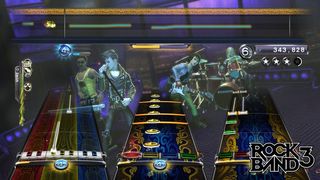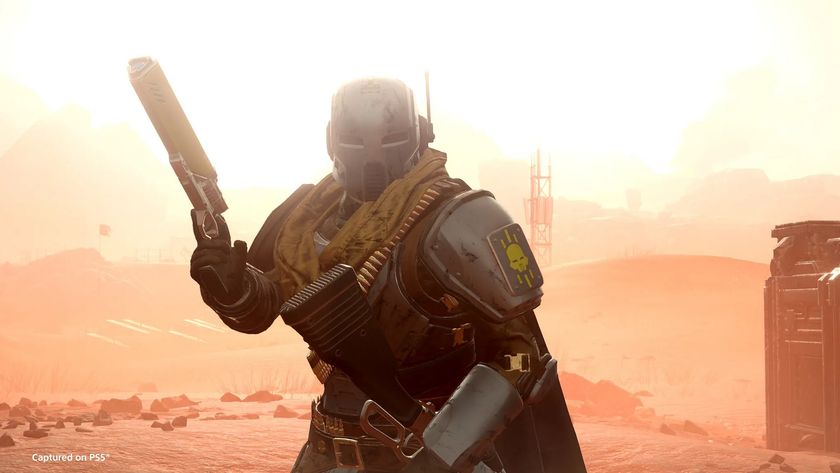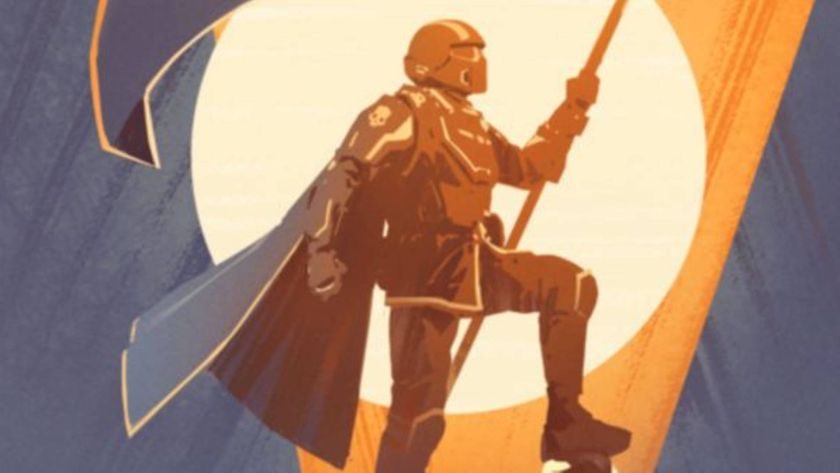Why Rock Band 3 is one of the greatest games ever made
For those about to read this Rock Band tribute, we salute you

Rock Band 3 is the epitome of a party game. No other co-op mode has captured crowd-pleasing entertainment as impeccably as Harmonix’s definitive rhythm title; no other rhythm game could so magnetize and entrance its onlookers, or make them so eager to join in the fun. It’s the kind of experience that makes gamers out of folks who’ve never touched an NES, PS2, or Xbox 360 controller in their lives. Mario Party, Buzz!, Raving Rabbids – they don’t even come close to the communal delight brought on by busting out Rock Band 3 during a lively get-together. It’s for these reasons that we've included Rock Band 3 on our list of the best games ever.
The original Rock Band laid the foundation for the franchise’s success, coaxing families, dorm mates, or frequent party hosts into dropping upwards of $200 for a box full of plastic instruments. The Guitar Hero series, which Harmonix had previously created, made the idea of fake guitars palatable to the American audience (who might’ve never given a second glance to Konami’s rare, Japanese-centric Guitar Freaks). The addition of a singer and drummer was the next logical step, uniting multiple rhythm game peripherals into one shared experience. The premise pioneered by Rock Band had other developers scrambling to get their own four-man acts together.
Rock Band 3 upped the ante by enabling seven-strong musical squadrons: a lead singer, two backup singers (thanks to tech from the previously-released The Beatles: Rock Band), guitar and bass players, a drummer, and the much-ballyhooed introduction of the keyboardist. The keyboard alone justified Rock Band 3’s existence; in terms of classic rock ‘n’ roll bands, this was the only element missing from previous entries in the series. For challenge-craving musicians (be they real or just replicating their favorite rock stars), the keyboard offered charts that dwarf the five-color note-playing of the other instruments.
But contrary to what Expert-level keyboard charts look like (particularly in Yes’ “Roundabout”), what really defines Rock Band 3 is its accessibility. Including the “No Fail” mode in the pause menu was a stroke of encouraging genius: Instead of bringing the team down, budding rock stars could get their bearings without disrupting the jam session. Harmonix had also perfected its process for mapping songs into Easy, Medium, Hard, and Expert note layouts. Each difficulty tier tries the players’ skills just so, motivating them to tackle the upper echelons of their abilities and break into the next level, where the whole process starts all over again.

For those who were already cruising on Expert difficulty, Rock Band 3 gave us new mountains to climb, with the exacting, often-Herculean trials of Pro mode. Pro mode is, in our minds, the closest you can possibly get to playing an instrument (and actually enjoying yourself) without investing precious years of your life. Hotshot guitarists must come to grips with a controller boasting 102 buttons in place of the original ten, the Pro keyboard tracks demand the precision of a true pianist, and Expert drummers had to adapt to the additional height dimension brought on by cymbals. Every previously conquered song was new again; we cherished revisiting old Rock Band 1 standbys like The Pixies’ “Wave of Mutilation” and Flyleaf’s “I’m So Sick,” songs we weren’t sure we’d ever play again before the Pro mode overhaul.
Sign up to the 12DOVE Newsletter
Weekly digests, tales from the communities you love, and more
Lucas Sullivan is the former US Managing Editor of 12DOVE. Lucas spent seven years working for GR, starting as an Associate Editor in 2012 before climbing the ranks. He left us in 2019 to pursue a career path on the other side of the fence, joining 2K Games as a Global Content Manager. Lucas doesn't get to write about games like Borderlands and Mafia anymore, but he does get to help make and market them.

"Games that get 19% user score do not generally recover": Helldivers 2 CEO reflects on Arrowhead's "summer of pain" and No Man's Sky-inspired redemption arc

Not for the first time, workers at Fallout, Doom, and The Elder Scrolls parent ZeniMax threaten strike at Microsoft: "Paying your employees a livable wage as a multi-trillion dollar company is the least they could be doing"











